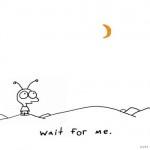
Moby Wait For Me
(Sony)
As far as artistic relevance goes, Moby has been virtually inactive for nearly a decade. Much of this indifference wasn’t his fault. So the guy became a poster-boy for selling out… but selling out from what, obscurity? It isn’t as though Moby was taken seriously by electronic purists in the first place and besides, this was the 90s; a period of decadence that the 80s is credited with but the 90s pushed to the brink. And tellingly, Play sold over nine million units – a near impossibility by today’s standards – while Moby licensed away all eighteen of the album’s songs for a multitude of movies, TV shows and car commercials. By the time 18 arrived in 2002 with his star-padded video for We Are All Made of Stars, the indie-rush had already resorted to the garage-rock of yore, and Moby’s soft backlash turned to widespread irrelevance.
Having donned a few metaphorical wigs since, from Hotel’s sterile guitarist to Last Night’s urban DJ, Moby’s new album carries a similar pretext. And while these announcements of genre-hopping begin to sound gimmicky – say, indicative of a once-affirmed artist reaching for inspiration, one music-style at a time – I embraced the idea of Moby-gone-ambient. Described as more personal and insular than past efforts, Wait For Me is a self-produced, bedroom record hell-bent on orchestrated moodiness. On paper (or website, where Moby initially posted the album’s details), this sounds appropriate, as if his microscopic moments of still-life beauty had found sanctuary from his otherwise straightforward clubbin’ focus. On record, however, these intentions are complicated by an unavoidable truth; namely, that Mr. Richard Melville Hall lacks the compositional chops for anything one would consider understated. What is an ambient album without subtlety? For that matter, what is an electronic album – an implied mood-piece, at that – without texture?
Indeed, what reads like a new direction with Wait For Me is actually stripped-down, bare-boned, predictable Moby, who by aiming for the same aural pleasure-centers, achieves the same tried-and-true results. An immersive opening of finger-picked, morose guitar sinks suddenly into a mid-tempo instrumental (Scream Pilots) that recalls to a fault the elementary-level piano twinkling that made Porcelain so popular. A smoky-voiced female carries JLTF through another series of simple piano progressions while Moby contributes his Bowie-lite vocals on Mistake, a New Order-esque anthem that begs to avoid making the same errors of the past all over again. Urg… is now the right time to just level with him? With such rigid use of percussion and a bevy of comfortable chord movements, Wait For Me is listenable – at times downright likeable – but tantamount to Moby’s past mistakes.
What makes this déjà-vu frustrating is that Wait For Me begins its sorrowful dive in rather graceful form, setting the tone with a mournful synth piece before engaging some tiptoed bass and restrained breakbeats in Pale Horses. Carrying effortlessly into the compressed guitar and live drums of first single Shot in the Back of the Head, Moby’s ability to evoke a feeling, a time and place – however syndicated – earns our attention outright. Then the wheels start coming off; Study War reclaims the banal art of littering spoken-word samples over sappy orchestration, allowing what sounds like an old Evangelical to repeat, ad nauseum, “the battle will be over”. There’s no context, nothing to connote an impression that this “battle” is anything more than universal rhetoric, or proof that Moby isn’t through reducing gospel to repetitive nonsense quite yet. And that’s without exploring the ankle-deep spirituality of the title track’s lyrics, which progress as such: “I’m going to ask you to look away / I love my hands but it hurts to pray”. In their generic artifices, these tracks betray the quiet resolve of Wait For Me’s better material, reminding us that as intelligent as Moby (the humanitarian, the all-around nice guy) is, he’s inexplicably taxed to create anything deeper than healing music for drama kids.
Despite the inclusion of those clunkers, Wait For Me remains Moby’s most interesting album since Play, trading his ADD stylistic jumps of that 1999 breakthrough for a more meditative, cohesive affair. A risky move, one that pays off (with the mysterious ‘Ghost Outfit’, the elegant ‘Isolate’) as seldom as it truly screws up. Between these two extremes lies the majority of Wait For Me, which hugs the middle of the road with such caution, it’s strenuous to either love or hate. In a desert-island neck-and-neck, this would easily be my Moby album of choice, not because it’s his best, and not because its cover-art is only useful for building a campfire. Here’s a record you can zone in or out of with equal concentration; that’s about as close to ambient as Moby will ever get.
10 July, 2009 - 20:37 — Ryan Pratt